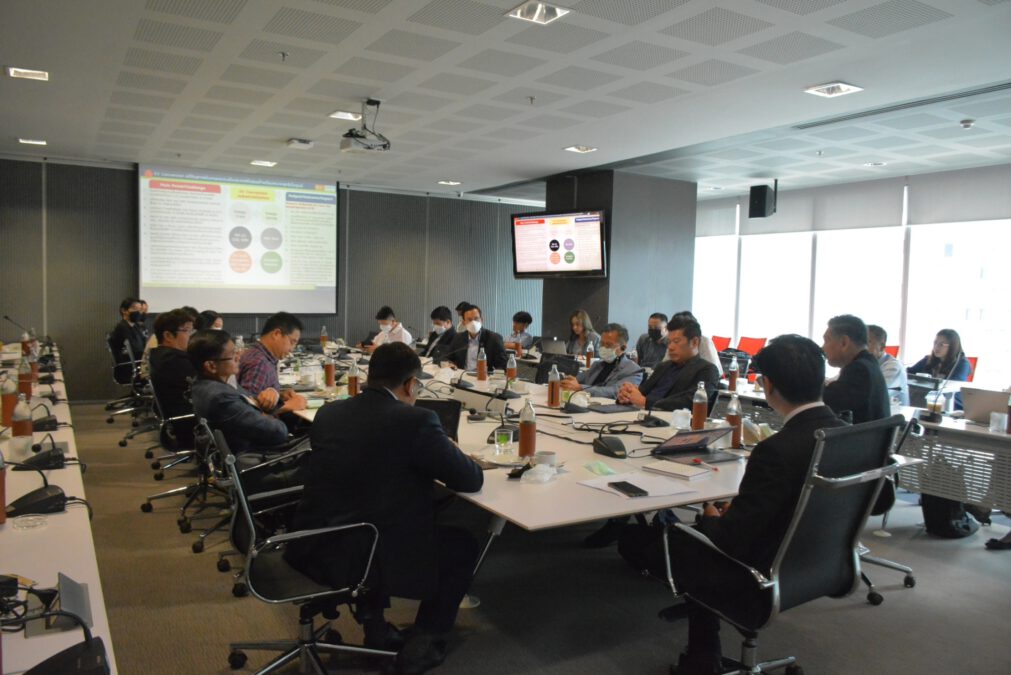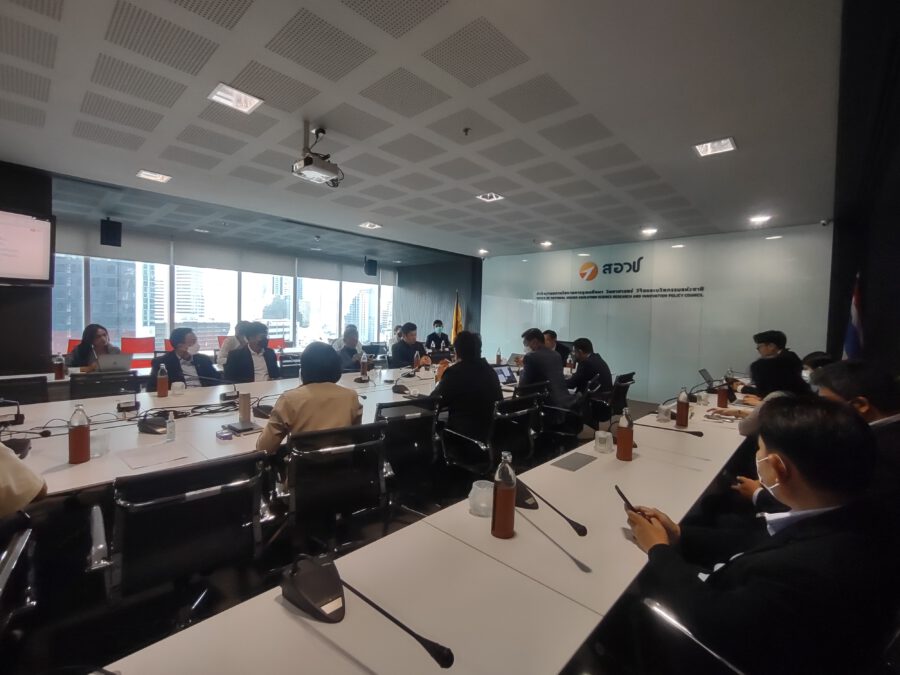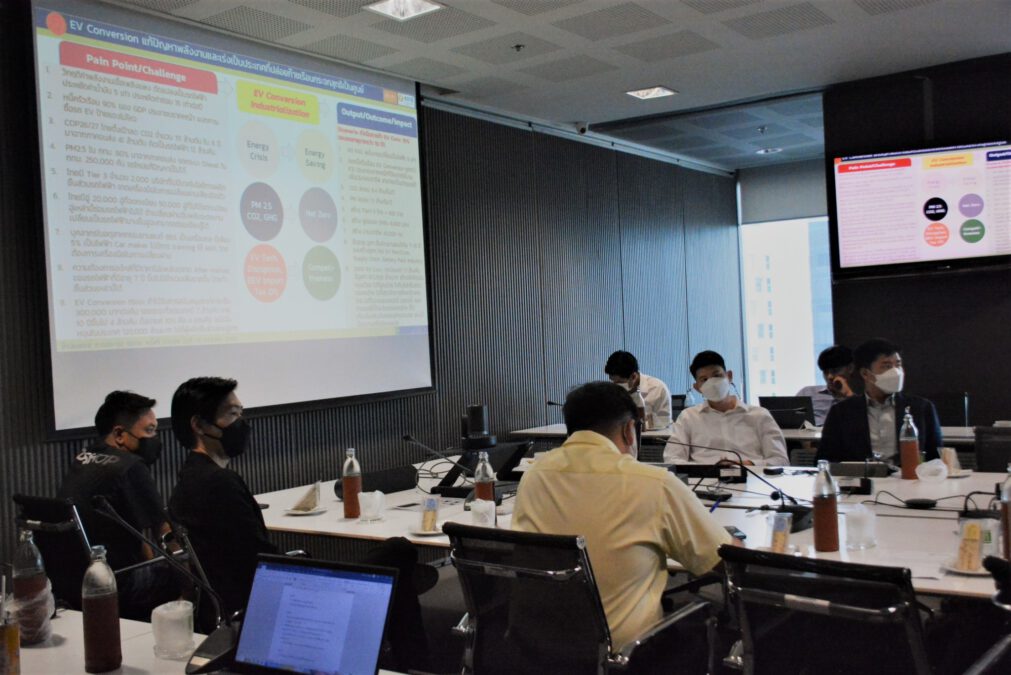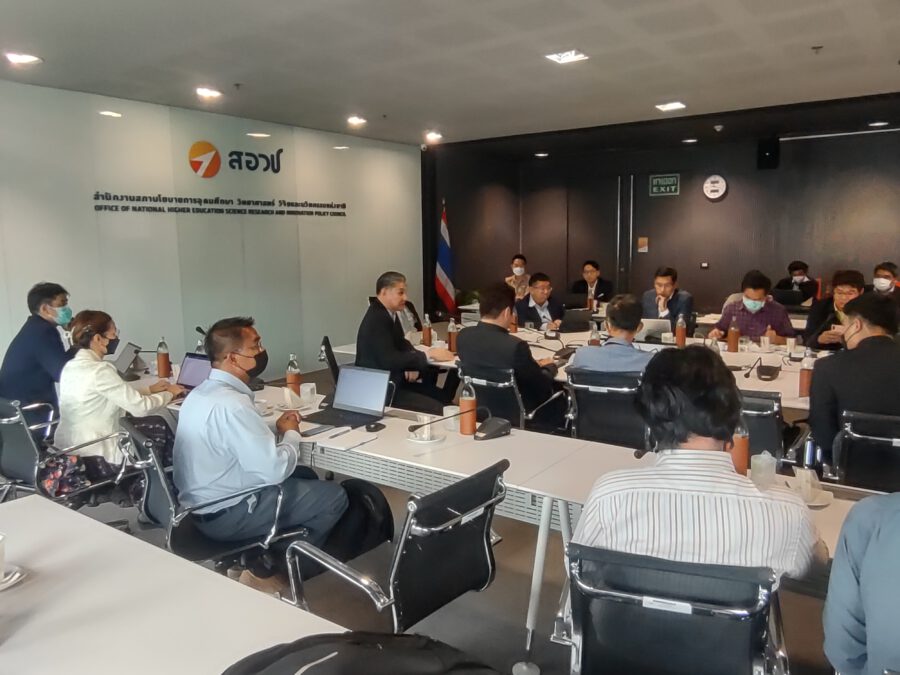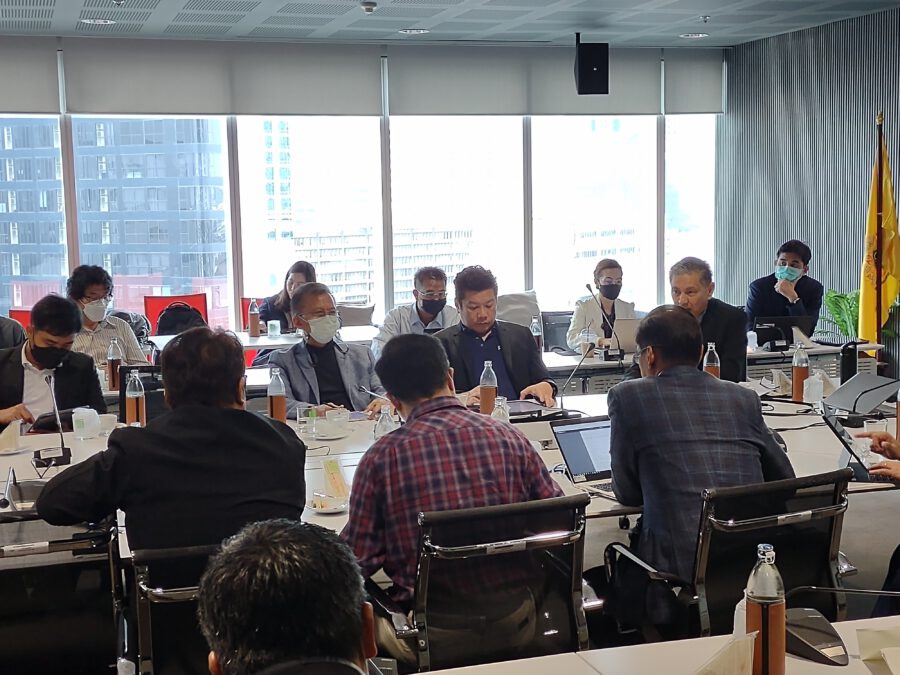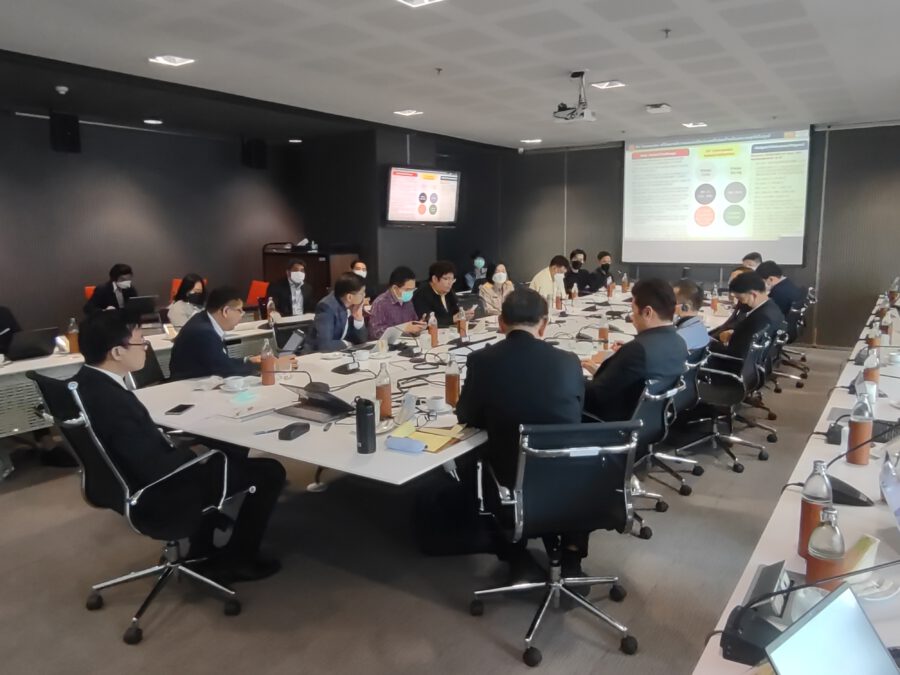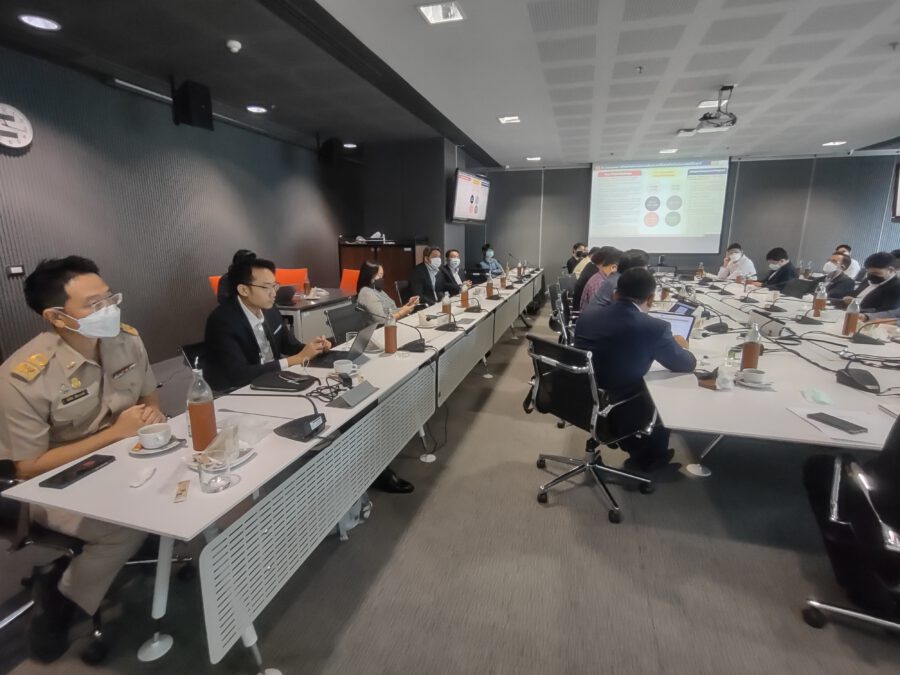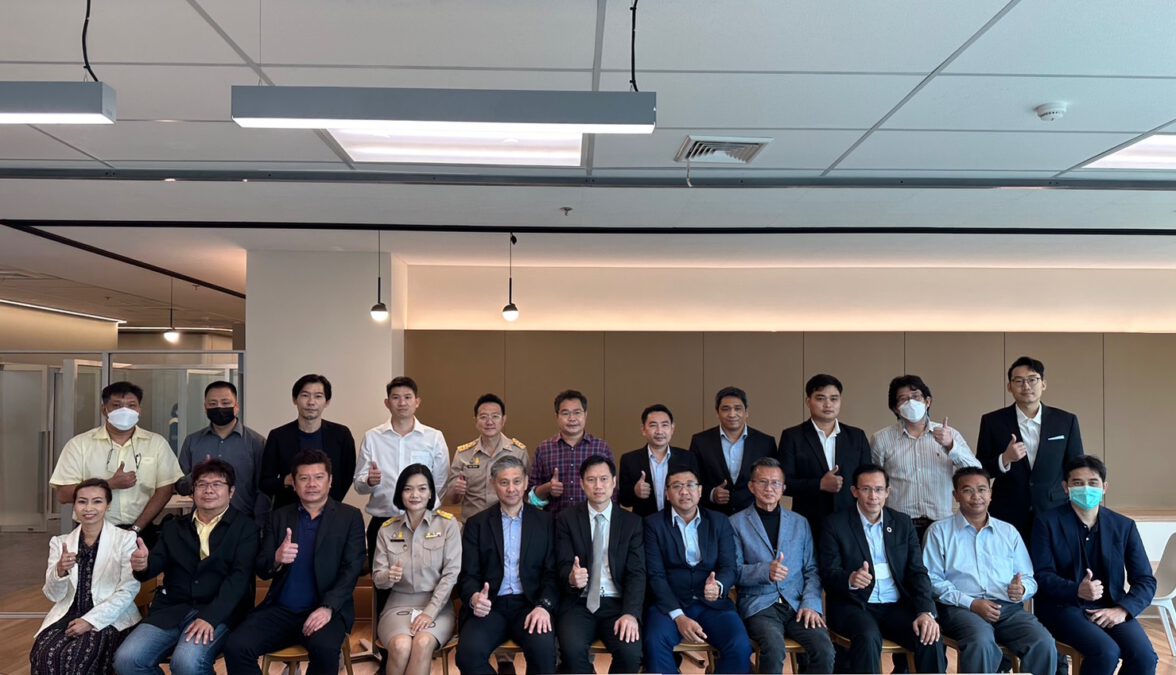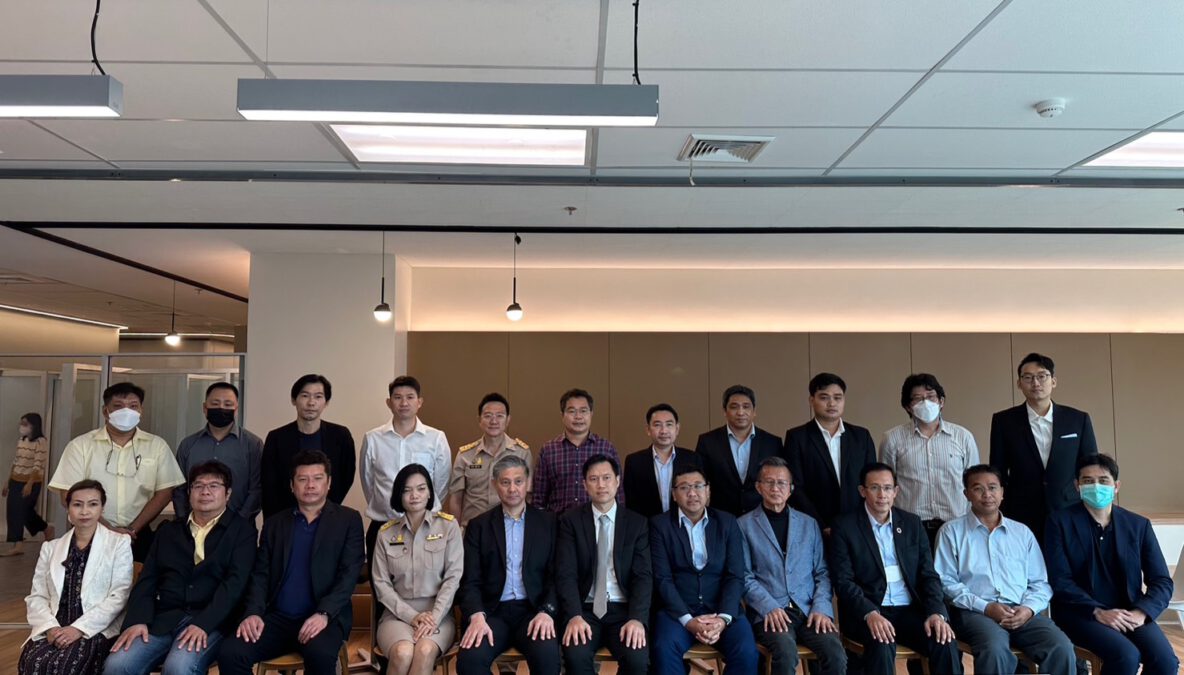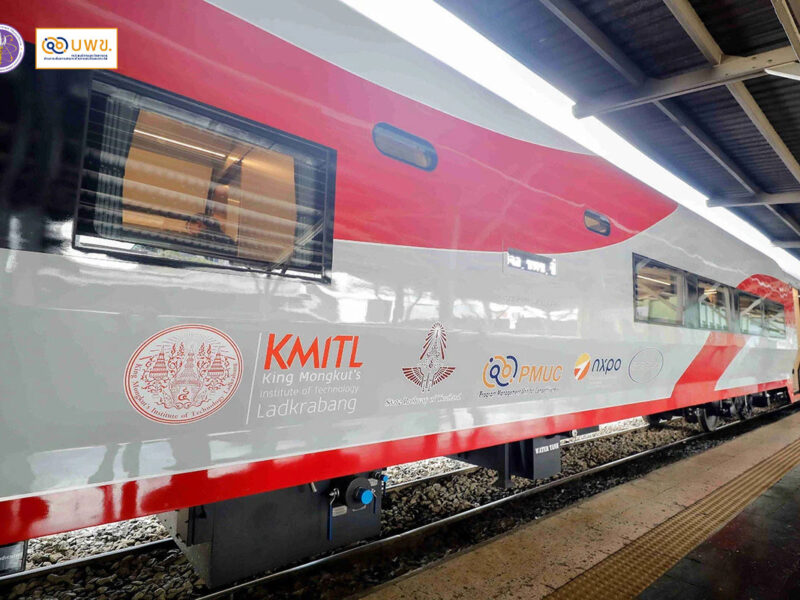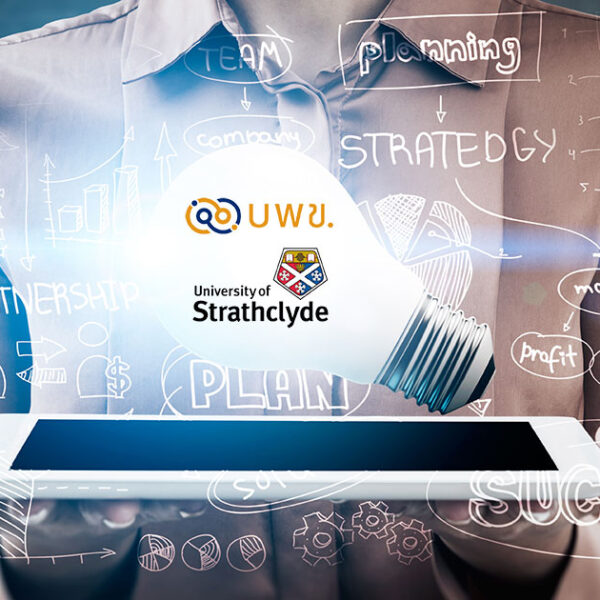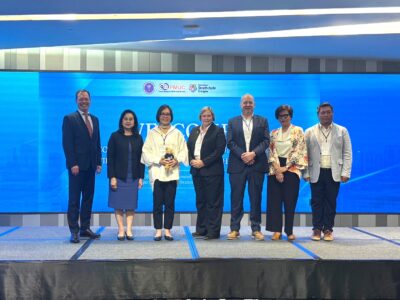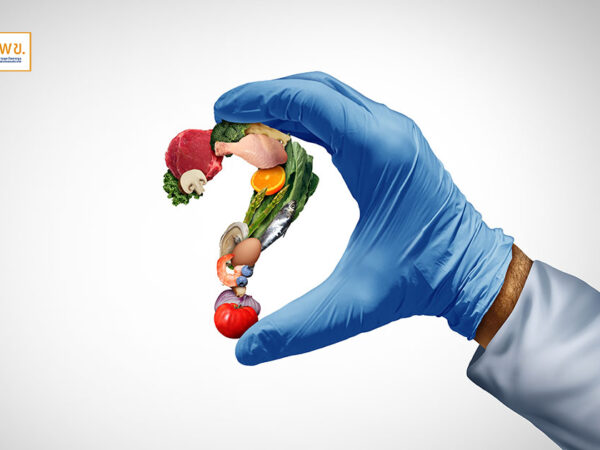On Monday, February 13, 2023, the National Science and Technology Development Agency (NSTDA) organized a meeting to exchange information/opinions in preparation to provide support mechanism for the EV Conversion Driving Committee” at Wa Kor 4, NSTDA, Chamchuri Square Building, 14th floor.
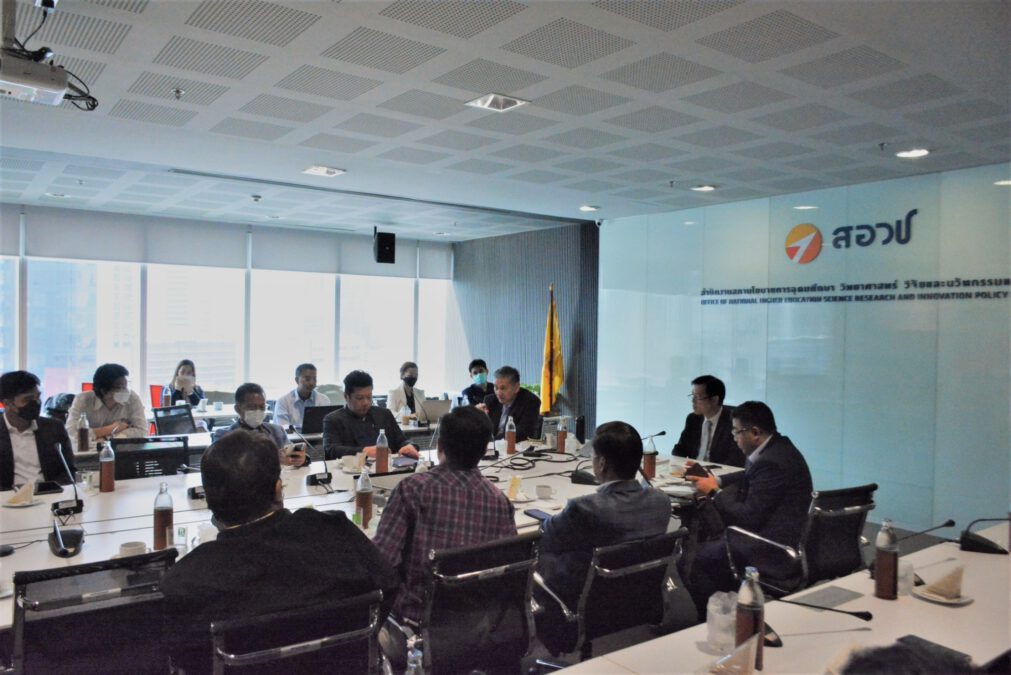
There were more than 35 participants from 15 government agencies, such as the Department of Land Transport, Ministry of Transport, Thai Industrial Standards Institute, Ministry of Industry, Program Management Unit for Competitiveness (PMUC), National Science and Technology Development Agency, etc. And from the education sector, participants included the Thai-Nichi Electric Vehicle Expert Center, Electric Vehicle Industry Development Taskforce, Eastern Special Development Zone Policy Committee, etc. On the side of the private sector, participants include Panus Assembly Company Limited, Cho Thavee Public Company Limited, ECU Shop 1 Company Limited, EV Car (Thailand) Company Limited, SNC Former Public Company Limited, AAPICO Hitech Public Company Limited,Thai Energy Storage System Technology Association, Thai Electric Vehicle Association, Research and development Center – Alternative Energy Institute Foundation of Thailand, etc. The exchange of information/opinions included the following topics:
- 1. Information on government support for EV conversion industry in foreign countries,
- 2. Regulations, standards on EV conversion in foreign countries, and
- 3. Working mechanisms to support the Thai EV Conversion Subcommittee. In summary, there were discussions about various aspects of the topic of the EV Conversion industry development as follows.
Dr. Thanakan Wongdeethai, strategist of the Office of National Higher Education Science Research and Innovation Policy Council (NXPO), served as the chairman of the meeting. He mentioned that the meeting was called as a result of the resolution of the National Board of EVs meeting held on February 2 nd , 2023, where it was decided that a driving subcommittee would be appointed on Monday, February 13 th , 2023. Also there will be a presentation of the results from the EV Conversion Show and Public Hearing meeting of the National Assembly on 24 th January, 2023, where there was an open forum to hear public opinions on a draft report on decision made by the House or Representative on supporting the creation of the Electricity
Conversion (EV Conversion) industry. It was concluded that there was a need for the government
to be the center of driving the creation of the Thai EV Conversion industry and there was a
proposal to consider setting up a working mechanism or association to drive for tangible results.
There was a presentation of information regarding government support for EV conversion
industry in other countries, such as setting challenging EV conversion targets in Indonesia, which
has set a goal to convert 6,000,000 electric motorcycles by the year 2030, and there is a subsidy
for the production of electric motorcycles and converted electric motorcycles in the amount of
15,530 baht (463 USD) per vehicle, etc. This shows the importance of driving the development of
the converted electric vehicle industry in the country along with the development of the electric
vehicle industry in order to prepare for the impending changes from disruptive technology as well
as from evolving regulations, standards related to EV conversion in foreign countries.
Interestingly, in Germany, France, India, and Indonesia, specific standards for EV conversion
have been issued and all have clear technical details. Overall, these countries have made progress
in advancing policy, legislation, and providing financial and non-financial support. This
information will be useful for formulating policies to support Thailand’s converted electric
vehicle industry. A draft policy proposal was presented to advocate for building Thailand’s EV
Conversion Industry and providing financial and non-financial support measures. Then there was
an open forum to allow the meeting attendees to voice their opinions.
Mrs. Siriporn Srithanawongchai, director of the Standardization Organization Division, TISI –
said that the National EV Board has considered important issues such as measures to drive the
production of internal combustion engine vehicles (ICE), which still accounts for a large
percentage of all cars in the country. The aim is to be able to transition to the production of cars
powered by electric power, and to establish a steering subcommittee overseeing the conversion of
existing cars to electric vehicles (EV Conversion), which is currently in the process of
deliberating on the appointment order.
Mr. Pariphat Buranasin, representative of the Electric Vehicle Industry Development
Taskforce, and the Eastern Economic Corridor Policy Committee, discussed the importance
of why the industry in Thailand needs to be subsidized, as well as the differences of each country
in the world that have different approaches and reasons for subsidizing, such as the Climate
Change Subsidy that facilitates the creation of industry, in turn resulting in supply availability.
Examples include Germany, which doesn’t subsidize, or California, USA, which initially didn’t
support EV conversion, but now regards it as an Alternative Industry. However, we first have to
truly understand the concept of a supply chain in relation to brand new EV vehicles, which the
average operators cannot afford. Therefore the policy regarding brand new EV’s is different from
that of converted EV. If operators do not have access to the battery industry, there will only be
brand new EV industry, which will cause a battery supply shortage. In terms of competitive
advantage, the new cars and the converted cars are not the same. The new cars use economy of
scale to compete, while the converted cars use a modular production method like Lego, making it
possible to share many of the components across many models. With every model, each
component of the conversion is considered similar to a Lego piece, while the management of the
supply chain is different for mechanical parts as compared to that of the electric parts. Electric
components tend to focus on compatibility from high voltage to low voltage. And the return on
investment of the conversion business is in software & programming, while the highest return on
investment is in system integration.
Assoc. Prof. Yotpong Lawonual, Ph.D., King Mongkut’s University of Technology at
Thonburi, said that having subsidy helps operators scale up. However, the same pain point as
LPG is that EV conversion devices are not yet standardized. If you look at conversion in the same
way as LPG, the question is whether or not the past measures have answered the question of
confidence. If looking in parallel with the brand new EV industry, the battery cell and motor may
be shared with new EVs. However, when there is a change to a new government and new a
minister, a case may need to be presented again to paint a clear picture of the benefits of
conversion to encourage a more systematic and wider-scope look at the problems that we want to
solve. For instance, high testing costs stemming from non-standardized components and
equipment might call for a more cooperative approach to reduce costs.
Mr. Paisarn Tangyarit, EV Car (Thailand) Co., Ltd. – We keep talking about supply chain,
but we overlook the necessity for experts in vehicle modification to ensure safety. First of all, we
need to create a workforce that specializes in security, battery structure, and battery life.
Otherwise, we may repeat the early days of gas conversion, causing loss of confidence in the
technology. The government is the center of communication with each relevant field of experts.
TISI and the Department of Transport can join the taskforce to provide legal advice on
registration, and students coming into the program must be trained for more than 1 year, because
being a professional technician is different from being an academician who focus only on
theoretical concepts. We are not yet in the robotic industry, we still need specialized
professionals, so we would like the NXPO to be the main sponsor because it is the most ready and
EV Car Thailand will send people to help with the training. Whether or not the goals that have
been set will come true will depend on the driving measures, and focusing on real practical
actions, and implemented regulations. We don’t want them to make unncessary mistakes. When
graduating from the National EV Center, there will be a certificate to certify the trained
personnel. The government is the center of negotiations for the converted car testing center to
expand throughout the country. Typical the testing cost will be in the tens of thousands, unless
there is help from universities such as King Mongkut’s Institute of Technology at Ladkrabang. In
the past, for the cost to come down, the main garages must be properly trained and certified by
specialists. EV conversion should not use all old parts except batteries. Other parts such as
motors, etc. that are 8-10 years old and up should be recycled because they are worn out. From
past experience, before a battery is damaged, there will be symptoms such as not charging,
charging too quickly, which must be looked at by an authorized repair shop. Other early signs
include heat-related fire, which may be caused by shorting of the cell combined with deteriorating
insulation. Putting out the fire must include cooling measures, and not only eliminating oxygen.
Mr. Krisada Uttamote, President of the Electric Vehicle Association of Thailand or EVAT,
said that the association has signed an MOU with the Ministry of Education, along with more
than 70 entrepreneurs, including Panus Assembly Co., Ltd., to support the development of quality
personnel for the EV Conversion industry. In addition, there is a plan for a converted electric
motorcycle competition, co-hosted together with NXPO, which is about to be held again for the
2nd year, for which there is a team that supports driving EV conversion in many aspects and is
ready to support the initiative.
Mr. Panus Watthanachai, Chief Executive Officer, Panus Assembly Company Limited –
First of all, I would like to commend Dr. Thanakan and the taskforce for diligently pushing for
EV Conversion, and recognizing EV Conversion as the starting point for the country to move
beyond being a contract manufacturer for already existing markets. Since we have existing cars,
the question is how to train SMEs to have hands-on knowledge about electrical systems?
Convertion is similar to R&D for new cars. In the future, the number of old cars will gradually
decrease. But it is creating the foundation for Future Mobility. The future is all electric systems,
including robots. This will generate demand. EV conversion should be subsidized more than the
brand new electric cars because the financial help will more likely reach the grassroot level. Thai
owned operations should receive full support, but not to block foreign companies. India already
achieved 60% Made in India. Then we have the America First campaign for the USA. We should
think a lot about supporting Thai entrepreneurs.
Mr. Polpot Wanpinyochep, Managing Director of ECU Shop 1 Co., Ltd, initially made a Microcontroller for the ICE motorcycles and pickup trucks. ICE began experimenting with conversion 5 years ago because they recognized it as the trend for the future. EV Conversion is a moving goal. Many more components and equipment can follow. Production and delivery to electric motorcycle companies, developing a charging station designed entirely by Thai people, and converting a tractor to make an agricultural drone, EV Conversion opens up opportunities for Thai researchers and Thai companies into the future.
Mr. Nattanai Hongsuraphan, Department of Land Transport Ministry of Transport – There
are entrepreneurs asking: if you take a new motorcycle frame and put an electric motor on it, is it
a conversion? Because there are entrepreneurs ready to open a production line. If given the
opportunity, a goal of 40,000 converted vehicles would be possible. If the objective was to
remove the old cars from the system, maybe there could be a program for exchanging new cars
for old cars. Because when looking at the End of Life issue, whether it’s a new car or a converterd
car, after 7–8 years, will people abandon their cars because of the price of batteries?
Mr. Pariphat Buranasin – the question whether or not to encourage and/or support buying old
chasses and doing an EV conversion ? All over the world, manufacturers cannot circumvent the
new car production regualtions by claiming EV conversion. There is usually a clear definition of
EV conversion. For example, in the EU, the car must be registered but there is no specific
requirement or limitation on the production year. The Department of Land Transport regulates car
usage, not the manufacturing process.
The EU divides EV conversions into two types: manufacturer conversions like Volkswagen, and the other is individual conversions, which is the type we’re talking about. The most open market is America. There, if all conditions are met, you pass. Some control in Europe, but individual conversions, such as in Sweden, there is a special license plate for converted vehicles. So it’s not a way to circumvent new car rules. Countries where old cars can be exchanged for new cars, must have purchasing power. Thailand, in contrast, household debt is at 90%. In addition, the number of targeted cars is too large to exchange for new cars. Within 8 years Thailand must reduce carbon emissions by 111 million tons. 1 car emits 3.4 tons of carbon. 41 million tons come from transportation. Half of that comes from old cars, which translates to 12 million old cars. We can’t possibly produce 12 million new cars in 8 years. Cars in 10 years are almost out of product liability. The third point is seldom mentioned: the energy consumption in the production of EVs. Conversion is a replacement, falling into the category of a circular economy. A lot of energy is spent in the production of brand new EV’s, while conversion uses the old existing equipment. Europe has started talking about
conversion, but hasn’t announced it yet because it doesn’t have any advantage. While we already know that California and Toyota have announced EV conversions, the EU has realized that conversion uses less energy than making new cars. In the current situation where there is conflict between countries, there is supply shortage, especially raw minerals used in making batteries.
Europe started with Urban Mining, but initial effort in repacking was not worth it, but the wars
going on, it became worth the cost. But EU has not yet made any announcement because there is
not yet clear advantage. We must recognize that conversion is an alternative industry and is not
against national EV policy. Conversion must not cause disruption in new vehicles industry.
Therefore, avoiding the new car rules is strictly forbidden. If the question is how old the car
should be to qualify for support, the rule of thumb is 10 years because the technology of that time was not as advanced as today. But the typical car structure was made stronger than today because the design had to account for a lot of safety factor. Conversion falls well under the criteria for BCG Funding. Therefore the interest is different from borrowing money from other sources.
Dr. Natthaphan Thanomsat, EEC Converted Electric Vehicle Expert Center – Started doing EV Conversion Testing Facility and developing to disseminate knowledge to garages, making a sandbox at the EEC and then expanded to other regions of Thailand.
Mr. Pariphat Buranasin – there are 4 areas bearing expenses: garage standards, modified car standards, component standards, and engineering standards. The Department of Land Transport is the final checkpoint of modified vehicle standards. TISI issues standards for conversion garages.
What doesn’t exist is the component standard. If you think that it’s a different industry than the new car industry, then component standards should be different. Some regulations are stricter than for new cars, because they have to be used with cars over 10 years old. The new car standard will have an advantage in EMC because new cars tend to have more electric components. The after market for EVs over 10 years old has already taken shape in New Zealand and Australia. As for engineering standards, credit must be given to the Department of Land Transport for issuing a
rule prohibiting 5 modifications before being allowed to register, because these 5 things affect basic vehicle engineering. However, individual EV conversion must stick to the original vehicle engineering. The idea of installing the electric motor directly on the rear axle has already been done, but it is still considered a violation of the Department of Land Transport regulations because it tampers with the original engineering design and, therefore, permission must first be obtained. But nowadays, it is found that this technique is useful and has been done a lot. We may have to think about how the system should be modified in order to legalize techniques which can now be implemented technically.
Mrs. Siriporn Srithanawongchai – TISI can enforce certain standards but must ask for opinions
about the expenses from the operator. If the service standard for garages is made a requirement,
then it will also lead to quality improvements at each step. TISI is currently establishing standards
for charging station.
On the part of proposed mechanism to support the subcommittee to drive the implementation of
converted electric vehicles (EV Conversion), the concensus in the meeting was that the private
sector should be brought together in order to share knowledge and information, and support each
other’s operations in a cohesive manner. There was also a proposal to establish a Thai converted
electric vehicle association and for the NXPO to be appointed the main sponsor in establishing such an association, which must work within a certain definite timeframe, and must work closely with the government, education and private sectors.
Dr. Thanakan Wongdeethai said that the office will accept this duty at least in the initial stage,
in order to allow various activities to continue. The association that will be established here will
not belong to any one person, but rather belongs to all of us. We need to work together to push for
the establishment of this industry in the country, and there will be updates on progress in various
aspects at the next meeting to be held next month. The meeting date and time will be announced
in the future. Thank you all for taking the time to comment today, and the meeting is now
adjourned.

